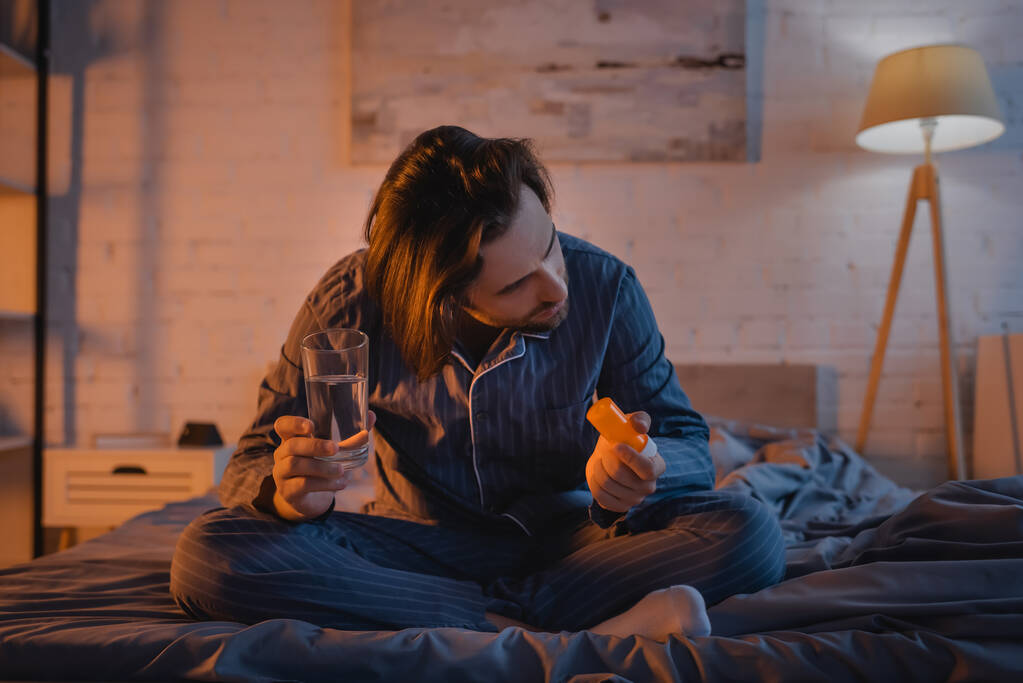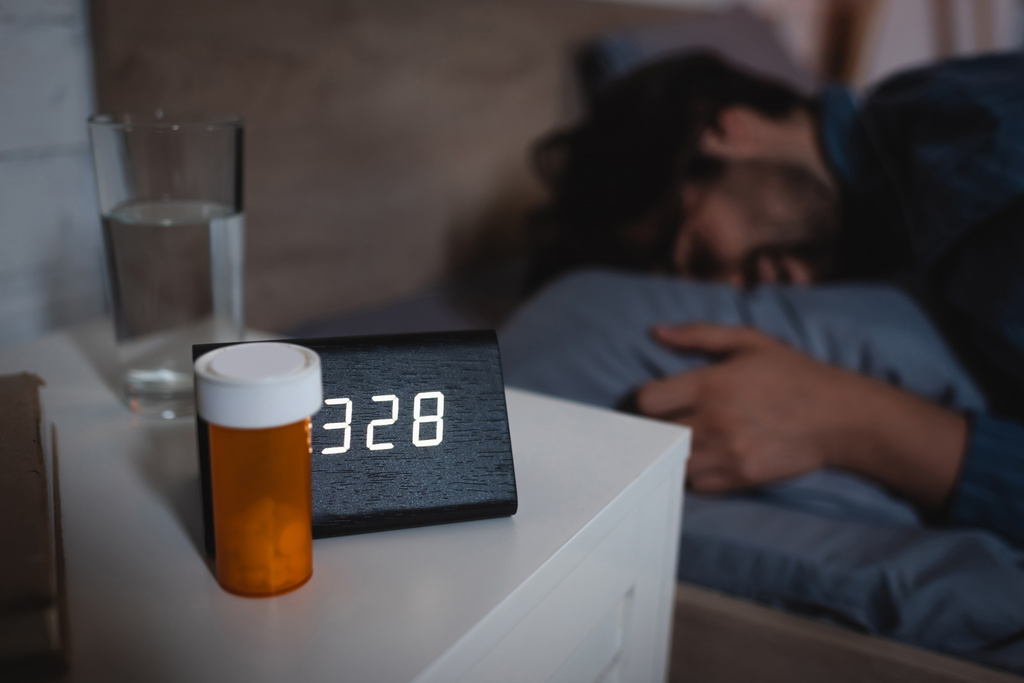Sleep Medication: Sleep Aid Explained
September 13, 2023

Welcome, dear reader, to the world of slumber and the magical potions that help us get there. Sleep, that elusive mistress, can sometimes be a tricky one to court. That's where sleep aids come in. They're like the wingman for your night, helping you to woo sleep into your embrace. But what exactly are these mystical sleep aids? Let's dive in and find out, shall we?
Our journey into the land of sleep aids is a fascinating one, filled with scientific jargon, historical anecdotes, and a dash of whimsy. We'll explore the different types of sleep aids, their uses, benefits, potential side effects, and more. So, put on your pajamas, grab a cup of chamomile tea, and let's embark on this journey together.

The History of Sleep Aids
Once upon a time, in a world without Netflix and smartphones, people relied on the setting sun to tell them when it was time to sleep. But even then, sleep didn't always come easy. Our ancestors, clever as they were, sought out natural remedies to help them catch some Z's. From poppy seeds to valerian root, they discovered a variety of plants and herbs that had sleep-inducing properties.
Fast forward a few centuries, and we find ourselves in the era of modern medicine. Scientists began to understand more about how sleep works and started developing medications to help those who struggled with sleep disorders. From barbiturates in the early 20th century to the benzodiazepines of the 1960s, the evolution of sleep aids is a fascinating tale of scientific discovery and innovation.
The Ancient Sleep Aids
Our ancestors were quite the innovative bunch, weren't they? They discovered that certain plants and herbs had a calming effect and could help induce sleep. Valerian root, for example, has been used for centuries as a natural sleep aid. It's believed to work by increasing the levels of a chemical called gamma aminobutyric acid (GABA) in the brain, which has a calming effect.
Then there's poppy seeds, which contain a small amount of morphine. Yes, you read that right. Morphine. But don't worry, the amount is so small that it's unlikely to have any significant effect. However, our ancestors didn't know that. They just knew that poppy seeds could help them sleep, and that was good enough for them.
The Modern Sleep Aids
As science advanced, so did our understanding of sleep and the development of sleep aids. In the early 20th century, barbiturates were introduced as a treatment for insomnia. They worked by depressing the central nervous system, which helped people fall asleep. However, they also had a high potential for abuse and addiction, and were eventually replaced by safer alternatives.
In the 1960s, benzodiazepines became the go-to sleep aid. They work in a similar way to barbiturates, but are less likely to cause addiction. However, they can still cause dependence if used for a long period of time. Today, there are a variety of sleep aids available, from over-the-counter antihistamines to prescription medications like zolpidem (Ambien).
The Types of Sleep Aids
Now that we've covered the history of sleep aids, let's take a look at the different types available today. From over-the-counter remedies to prescription medications, there's a sleep aid for almost every type of sleep problem.
But remember, dear reader, not all sleep aids are created equal. Some are better suited for certain types of sleep problems than others. And some come with potential side effects that you should be aware of. So, let's explore the different types of sleep aids and their uses.
Over-the-Counter Sleep Aids
Over-the-counter sleep aids are readily available at your local pharmacy without a prescription. They typically contain antihistamines, which are medications originally designed to treat allergies. Antihistamines work by blocking histamine, a chemical in the body that promotes wakefulness. As a result, they can make you feel drowsy and help you fall asleep.
However, over-the-counter sleep aids are not meant for long-term use. They can cause side effects like dry mouth, dizziness, and daytime drowsiness. They can also become less effective over time as your body builds up a tolerance to them. So, they're best used for occasional sleep problems, like jet lag or a temporary change in your sleep schedule.
Prescription Sleep Aids
Prescription sleep aids are medications that your doctor can prescribe to help you sleep. They're typically used for more severe or chronic sleep problems, like insomnia. There are several types of prescription sleep aids, including benzodiazepines, non-benzodiazepines, and melatonin receptor agonists.
Benzodiazepines, like temazepam (Restoril), work by slowing down the activity in your brain, which helps you fall asleep. Non-benzodiazepines, like zolpidem (Ambien), work in a similar way, but are generally considered safer and less likely to cause dependence. Melatonin receptor agonists, like ramelteon (Rozerem), work by mimicking the effects of melatonin, a hormone that regulates sleep.
The Benefits of Sleep Aids
Sleep aids can be a godsend for those who struggle with sleep problems. They can help you fall asleep faster, stay asleep longer, and improve the quality of your sleep. This can have a positive impact on your overall health and well-being, as sleep plays a crucial role in everything from your mood to your immune system.
However, it's important to remember that sleep aids are not a cure-all. They're meant to be used as a temporary solution while you work on addressing the underlying cause of your sleep problems. This could involve lifestyle changes, like improving your sleep hygiene or managing stress, or it could involve treating a medical condition that's interfering with your sleep.
Improved Sleep Quality
One of the main benefits of sleep aids is that they can improve the quality of your sleep. This means that you're not just sleeping longer, but you're also sleeping deeper. Deep sleep is the most restorative stage of sleep, where your body repairs and regrows tissues, builds bone and muscle, and strengthens the immune system.
With improved sleep quality, you're likely to wake up feeling more refreshed and energized. This can have a positive impact on your mood, productivity, and overall quality of life. So, if you're struggling with poor sleep quality, a sleep aid might be just what you need to get your sleep back on track.
Reduced Sleep Onset Latency
Sleep onset latency is a fancy term for the amount of time it takes you to fall asleep after you've gone to bed. For people with insomnia, this can be a major issue. They might lie awake for hours, tossing and turning, unable to fall asleep. This is where sleep aids can help.
Many sleep aids work by promoting relaxation and reducing anxiety, which can help you fall asleep faster. This can be particularly helpful for people with sleep onset insomnia, a type of insomnia where the main issue is falling asleep at the beginning of the night. So, if you're spending more time counting sheep than actually sleeping, a sleep aid might be worth considering.
The Potential Side Effects of Sleep Aids
While sleep aids can be incredibly helpful, they're not without their potential side effects. These can range from mild issues like dry mouth and dizziness to more serious problems like dependence and withdrawal symptoms. It's important to be aware of these potential side effects before you start taking a sleep aid.
Remember, dear reader, sleep aids are not a magic bullet. They're a tool to help you sleep better, but they're not without their risks. Always talk to your doctor before starting a new sleep aid, and make sure you're aware of the potential side effects and how to manage them.
Common Side Effects
The most common side effects of sleep aids include drowsiness, dizziness, dry mouth, constipation, and blurred vision. These are typically mild and go away on their own as your body adjusts to the medication. However, if these side effects persist or become bothersome, you should talk to your doctor.
Some sleep aids can also cause a hangover-like effect, where you feel groggy and unrefreshed the next morning. This is more common with sleep aids that have a long half-life, meaning they stay in your system for a long time. To avoid this, you might need to adjust your dosage or switch to a different sleep aid.
Severe Side Effects
In rare cases, sleep aids can cause severe side effects like memory problems, hallucinations, and severe allergic reactions. If you experience any of these side effects, you should stop taking the sleep aid and seek medical attention immediately.
Some sleep aids can also cause parasomnias, which are abnormal behaviors that occur during sleep. These can include sleepwalking, sleep eating, and even sleep driving. While these side effects are rare, they can be dangerous, so it's important to be aware of them.

Conclusion: The Magic of Sleep Aids
And there you have it, dear reader, a comprehensive guide to the magical world of sleep aids. From their humble beginnings in the form of plants and herbs to the sophisticated medications we have today, sleep aids have come a long way. They can be a powerful tool in your quest for a good night's sleep, but they're not without their potential pitfalls.
Remember, sleep aids are not a cure-all. They're meant to be used as a temporary solution while you work on addressing the underlying cause of your sleep problems. Always talk to your doctor before starting a new sleep aid, and make sure you're aware of the potential side effects and how to manage them.
So, whether you're struggling with occasional sleep problems or chronic insomnia, there's a sleep aid out there for you. Just remember to use them wisely, and always under the guidance of a healthcare professional. Sweet dreams!

 Back to Blog
Back to Blog